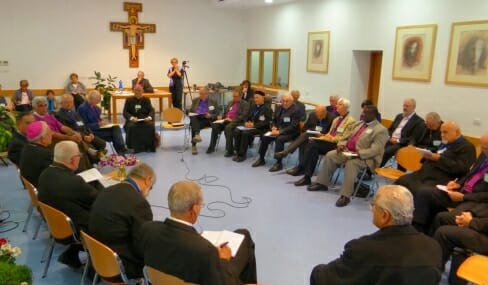
Nov 24, 2015 | Focolare Worldwide
 The 34th Conference of Bishops of different Churches, promoted by the Focolare Movement, will start on 25 November 2015. It will be held on the island of Heybeliada (Halki), in the sea of Marmara, near Istanbul. The 150 participants, from 9 different countries, will be hosted in the Monastery on this island, which was once the seat of the prestigious Greek-Orthodox theological Academy of Halki. The 50 participants, from 19 countries, are much awaited by His Holiness Bartholomew I, who during a recent interview, in the wake of the Honoris Causa doctorate in the Culture of Unity conferred upon him by the Sophia University Institute, affirmed that: “At Halki we will together remember Chiara Lubich and pray for the repose of her soul. We will be able to express our commitment to work for the unity of Churches. We, the Church of Constantinople are pleased to welcome these cardinals and bishops, and we are ready to exchange our experiences and give one another the kiss of peace between the East and the West”. “Together for our common home” will be the theme of this conference, which will focus on unity, as a service to the human family, through a diversity of gifts. The main speakers will be Patriarch Bartholomew I and Maria Voce, while Cardinal Francis Kriengsak, Archbishop of Bangkok will be the moderator of the conference. Various bishops from different Churches will share their reflections; among them, the Anglican Bishop Robin Smith; Åke Bonnier, Lutheran Bishop of the Swedish Church; the Catholic Bishop Brendan Leahy, Bishop Sahak Mashalyan of the Armenian Apostolic Church and the Metropolitan Elpidophoros of Halki. Jesús Morán, the co-president of the Focolare Movement will offer his reflection on “The Charism of Unity and the challenges of today’s humanity”. Gerhard Pross, an Evangelical from YMCA, Germany will speak about “Achievements and experiences on the road to unity” in the name of “Together for Europe”, the ecumenical network of movements and communities. Cardinal Kurt Koch, who will lead a Holy See delegation to Istanbul for St. Andrew’s feast, will also speak during the Conference. His talk will be about “Pope Francis and the cause of Christian Unity”. In a church of Armenian Apostolic tradition of ancient Chalcedon, the seat of the Chalcedonian Ecumenical Council of 451, the bishops will once again formulate a pact of reciprocal love, thus renewing the mutual relationship of charity that goes beyond all divisions and answers Jesus’s invitation: “Love one another as I have loved you” (Jn 15:12). In this particular context, this invitation implies the reciprocal promise “to love the Church of the other as one’s own”. The bishops are invited by Patriarch Bartholomew to participate in the celebrations at the Phanar on the 29 and 30 November on the occasion of the feast of St. Andrew, Patron of the Patriarchate of Constantinople. These meetings for bishops of different Churches, promoted by the Focolare Movement, are held annually. These meetings have been taking place since 1982, and they owe their beginning to a suggestion made by Pope John Paul II to a group of Catholic bishops, friends of the Focolare Movement, when he invited them to share their experience of “effective and affective” communion even with bishops of other churches. Promoted by Klaus Hemmerle, who was then bishop of Aaachen, Germany, and after his death by Miloslav Vlk, Cardinal of Prague, these meetings aim at offering vital spaces of communion and fraternal sharing in the light of the spirituality of unity. The venue for these meetings changes; they are held in places that are meaningful to the various Christian denominations. In 2016 the meeting will be held in Ottmaring (Augsburg – Germany).
The 34th Conference of Bishops of different Churches, promoted by the Focolare Movement, will start on 25 November 2015. It will be held on the island of Heybeliada (Halki), in the sea of Marmara, near Istanbul. The 150 participants, from 9 different countries, will be hosted in the Monastery on this island, which was once the seat of the prestigious Greek-Orthodox theological Academy of Halki. The 50 participants, from 19 countries, are much awaited by His Holiness Bartholomew I, who during a recent interview, in the wake of the Honoris Causa doctorate in the Culture of Unity conferred upon him by the Sophia University Institute, affirmed that: “At Halki we will together remember Chiara Lubich and pray for the repose of her soul. We will be able to express our commitment to work for the unity of Churches. We, the Church of Constantinople are pleased to welcome these cardinals and bishops, and we are ready to exchange our experiences and give one another the kiss of peace between the East and the West”. “Together for our common home” will be the theme of this conference, which will focus on unity, as a service to the human family, through a diversity of gifts. The main speakers will be Patriarch Bartholomew I and Maria Voce, while Cardinal Francis Kriengsak, Archbishop of Bangkok will be the moderator of the conference. Various bishops from different Churches will share their reflections; among them, the Anglican Bishop Robin Smith; Åke Bonnier, Lutheran Bishop of the Swedish Church; the Catholic Bishop Brendan Leahy, Bishop Sahak Mashalyan of the Armenian Apostolic Church and the Metropolitan Elpidophoros of Halki. Jesús Morán, the co-president of the Focolare Movement will offer his reflection on “The Charism of Unity and the challenges of today’s humanity”. Gerhard Pross, an Evangelical from YMCA, Germany will speak about “Achievements and experiences on the road to unity” in the name of “Together for Europe”, the ecumenical network of movements and communities. Cardinal Kurt Koch, who will lead a Holy See delegation to Istanbul for St. Andrew’s feast, will also speak during the Conference. His talk will be about “Pope Francis and the cause of Christian Unity”. In a church of Armenian Apostolic tradition of ancient Chalcedon, the seat of the Chalcedonian Ecumenical Council of 451, the bishops will once again formulate a pact of reciprocal love, thus renewing the mutual relationship of charity that goes beyond all divisions and answers Jesus’s invitation: “Love one another as I have loved you” (Jn 15:12). In this particular context, this invitation implies the reciprocal promise “to love the Church of the other as one’s own”. The bishops are invited by Patriarch Bartholomew to participate in the celebrations at the Phanar on the 29 and 30 November on the occasion of the feast of St. Andrew, Patron of the Patriarchate of Constantinople. These meetings for bishops of different Churches, promoted by the Focolare Movement, are held annually. These meetings have been taking place since 1982, and they owe their beginning to a suggestion made by Pope John Paul II to a group of Catholic bishops, friends of the Focolare Movement, when he invited them to share their experience of “effective and affective” communion even with bishops of other churches. Promoted by Klaus Hemmerle, who was then bishop of Aaachen, Germany, and after his death by Miloslav Vlk, Cardinal of Prague, these meetings aim at offering vital spaces of communion and fraternal sharing in the light of the spirituality of unity. The venue for these meetings changes; they are held in places that are meaningful to the various Christian denominations. In 2016 the meeting will be held in Ottmaring (Augsburg – Germany).
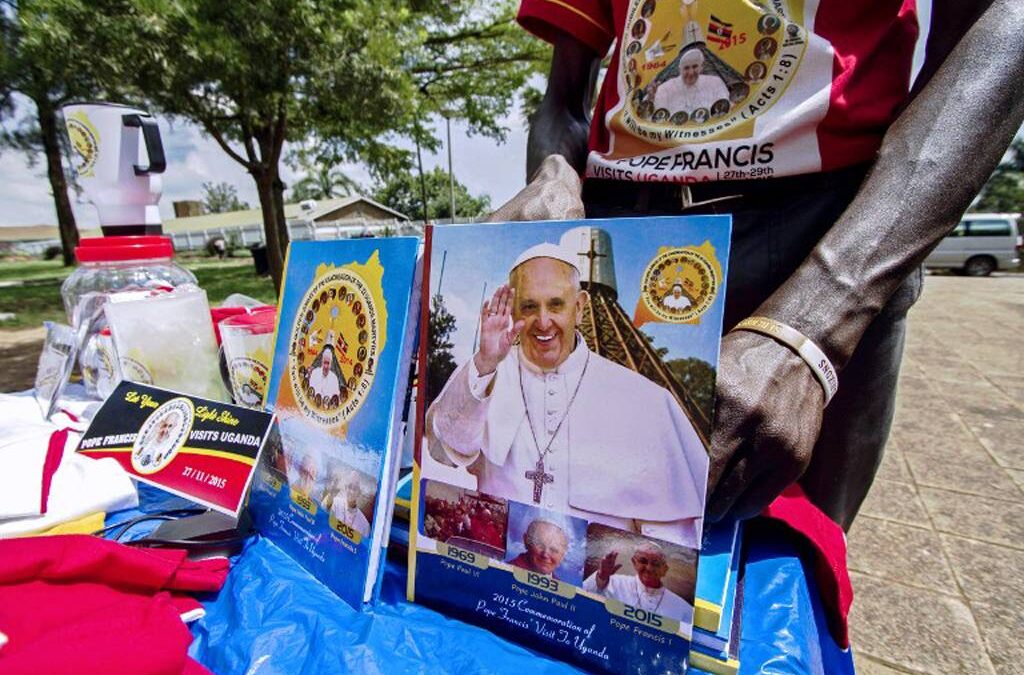
Nov 23, 2015 | Focolare Worldwide
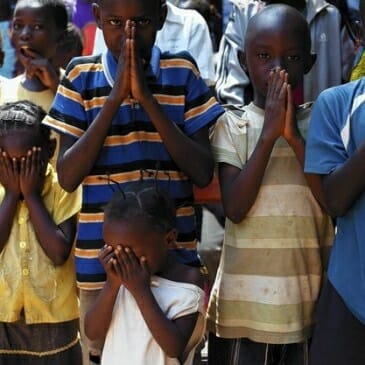 «The key perspective of this trip will be revealed in the programme and activities the Pope will undertake,» says Liliane Mugombozi, director of New City, the magazine of the Focolare Movement in Kenya. Through her we will trace the steps of a journey which is revealing to be very important. «Pope Francis chose three countries where there are big Catholic communities afflicted by various tensions which he wishes to share as the pastor of the people, and together write a new page in the history of Africa today within a global framework and walk in search of solutions to the biggest problems and concerns of the population.» And what are the expectations? «We want his message to resound in all sectors of life, from governance to the management of goods, and from politics to education, healthcare, dialogue and interreligious relationships …». And to those who object because Pope Francis knows very little of Africa, the Archbishop of Kinshasa in the Democratic Republic of Congo, Cardinal Monsengwo replied: «This is true. But the really fantastic thing is that he goes where people suffer. If it wasn’t for the Ebola outbreak, he would have come to Africa a long time ago.» Since last 19 October when the Vatican confirmed the date of the journey, innumerable analyses accompanied this announcement: «In Kenya – Lili Mugombozi wrote – the battle against Al-shabab, responsible for the violent attacks over the last few years, is one of the biggest political challenges. Mons. Rotich, president of the secretariat in charge of the visit affirmed: «During our ad limina visit in Rome, he questioned us about the massacre in Garissa and he said that he would come to comfort the Kenyan people.» In Uganda, Pope Francis will visit the Anglican and Catholic sanctuaries to honour the memory of the young martyrs: 23 Anglicans and 22 Catholics who were killed because of their faith. «For many Uganda people – Liliane explained further – Francis’s gesture is a joyful revival of the past – when in 1969 – Paul VI, the first Pope to ever set foot on African soil, canonized the first African Saints – but it is also a new commitment to dialogue with the churches.» The Focolare in Uganda wrote: «On this anniversary we feel particularly called to live the sanctity of the people.»
«The key perspective of this trip will be revealed in the programme and activities the Pope will undertake,» says Liliane Mugombozi, director of New City, the magazine of the Focolare Movement in Kenya. Through her we will trace the steps of a journey which is revealing to be very important. «Pope Francis chose three countries where there are big Catholic communities afflicted by various tensions which he wishes to share as the pastor of the people, and together write a new page in the history of Africa today within a global framework and walk in search of solutions to the biggest problems and concerns of the population.» And what are the expectations? «We want his message to resound in all sectors of life, from governance to the management of goods, and from politics to education, healthcare, dialogue and interreligious relationships …». And to those who object because Pope Francis knows very little of Africa, the Archbishop of Kinshasa in the Democratic Republic of Congo, Cardinal Monsengwo replied: «This is true. But the really fantastic thing is that he goes where people suffer. If it wasn’t for the Ebola outbreak, he would have come to Africa a long time ago.» Since last 19 October when the Vatican confirmed the date of the journey, innumerable analyses accompanied this announcement: «In Kenya – Lili Mugombozi wrote – the battle against Al-shabab, responsible for the violent attacks over the last few years, is one of the biggest political challenges. Mons. Rotich, president of the secretariat in charge of the visit affirmed: «During our ad limina visit in Rome, he questioned us about the massacre in Garissa and he said that he would come to comfort the Kenyan people.» In Uganda, Pope Francis will visit the Anglican and Catholic sanctuaries to honour the memory of the young martyrs: 23 Anglicans and 22 Catholics who were killed because of their faith. «For many Uganda people – Liliane explained further – Francis’s gesture is a joyful revival of the past – when in 1969 – Paul VI, the first Pope to ever set foot on African soil, canonized the first African Saints – but it is also a new commitment to dialogue with the churches.» The Focolare in Uganda wrote: «On this anniversary we feel particularly called to live the sanctity of the people.» 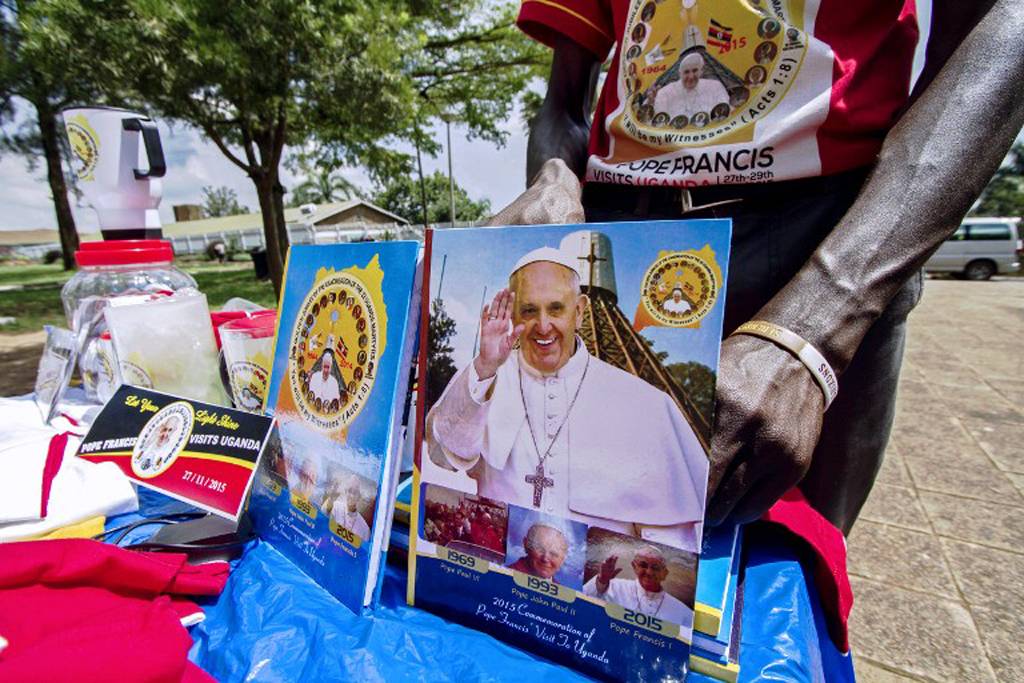 In the Central African Republic, in a tense political context which suscitates anxiety, «in order to manifest to this nation how much the Church feels and shares its afflictions, and urge all central Africans to always be testimonials of mercy and reconciliation,» on 29 November, Francis will open the holy door of the cathedral of Bangui, symbolically anticipating the start of the Jubilee Year of Mercy, and will give a very strong sign of this with his speech in the central Mosque. «In each of these countries – the New City director continued – the Pope will meet the heads of State, speak to the diplomatic corps, celebrate a public Mass where thousands of faithful will be expected, and hold various meetings with religious leaders and thousands of young people. And the poor, those who suffer will not be excluded from the meetings with him: he will meet the inhabitants of the slums of Kangemi at the outskirts of Nairobi, and the disabled in a nursing home in Nalukolongo in the Kampala district in Uganda, and in one of the refugee camps in the Central African Republic.» Also the members of the Focolare Movement will accompany the Pope’s journey to Africa with their prayers and concrete preparations. In Kenya they will be in various places: among the 10,000 volunteers of the security guards and in the delegations of universities, schools and parishes. A young woman, Mary Mutungi, will direct the choir of 600 university students during the Mass with the youth. Among the songs in the programme is also, “We can find a way to live in Peace,” written by a Filipino band on the occasion of the Genfest. In Uganda, the members of the Focolare are involved in the various preparations in the parishes. Some are in charge of the coordination activities for the Diocese. Another citizen of the Republic of Central Africa, Geneviève Sanzè, of the International Centre and a member of the Pontifical Council for the Laity, will participate in the last stage of the papal visit. Fidelia from Bangui, affirmed: «Our people so deeply hope that the Pope’s visit will help us to accomplish a deep conversion, and be predisposed towards reconciliation for an enduring peace.» Video message of the Holy Father at the Vigil of the journey to Kenya and Uganda
In the Central African Republic, in a tense political context which suscitates anxiety, «in order to manifest to this nation how much the Church feels and shares its afflictions, and urge all central Africans to always be testimonials of mercy and reconciliation,» on 29 November, Francis will open the holy door of the cathedral of Bangui, symbolically anticipating the start of the Jubilee Year of Mercy, and will give a very strong sign of this with his speech in the central Mosque. «In each of these countries – the New City director continued – the Pope will meet the heads of State, speak to the diplomatic corps, celebrate a public Mass where thousands of faithful will be expected, and hold various meetings with religious leaders and thousands of young people. And the poor, those who suffer will not be excluded from the meetings with him: he will meet the inhabitants of the slums of Kangemi at the outskirts of Nairobi, and the disabled in a nursing home in Nalukolongo in the Kampala district in Uganda, and in one of the refugee camps in the Central African Republic.» Also the members of the Focolare Movement will accompany the Pope’s journey to Africa with their prayers and concrete preparations. In Kenya they will be in various places: among the 10,000 volunteers of the security guards and in the delegations of universities, schools and parishes. A young woman, Mary Mutungi, will direct the choir of 600 university students during the Mass with the youth. Among the songs in the programme is also, “We can find a way to live in Peace,” written by a Filipino band on the occasion of the Genfest. In Uganda, the members of the Focolare are involved in the various preparations in the parishes. Some are in charge of the coordination activities for the Diocese. Another citizen of the Republic of Central Africa, Geneviève Sanzè, of the International Centre and a member of the Pontifical Council for the Laity, will participate in the last stage of the papal visit. Fidelia from Bangui, affirmed: «Our people so deeply hope that the Pope’s visit will help us to accomplish a deep conversion, and be predisposed towards reconciliation for an enduring peace.» Video message of the Holy Father at the Vigil of the journey to Kenya and Uganda
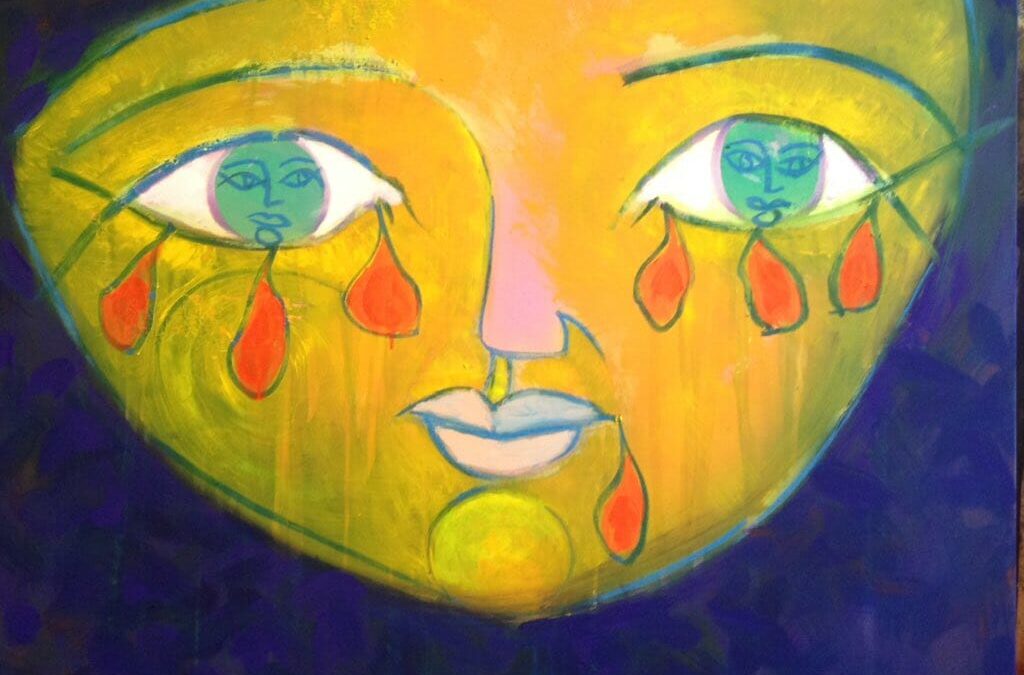
Nov 20, 2015 | Focolare Worldwide
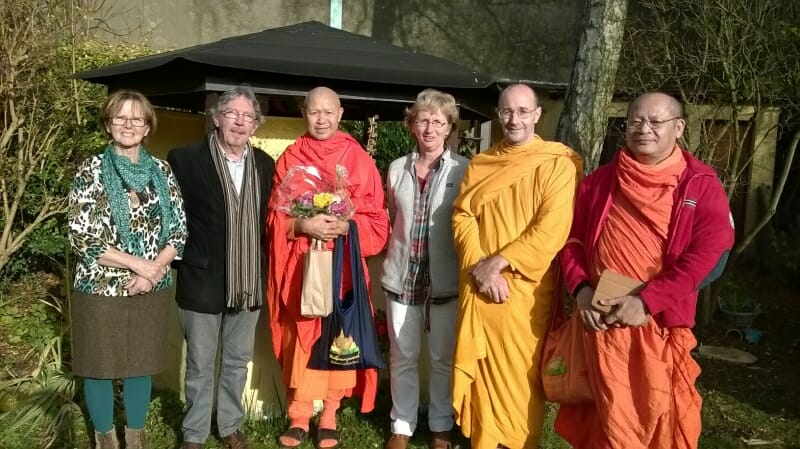 In the face of the dramatic events that took place in Paris and in many other parts of the world, “the Focolare Movement, while it weeps with those who weep, continues to believe in the path of dialogue, of acceptance and of respect for the other, whoever that may be and from whatever provenance, religious belief, and ethnicity,” Focolare president Maria Voce stated on the day after the attacks in the French capital. The Focolare, together with those with different responsibilities who work for peace even at personal risk, renews its commitment to intensify and multiply acts and gestures of reconciliation, spaces for dialogue and communion, opportunities for encounter and sharing at all levels and in all parts of the world to embrace the cry of humanity and transform it into new hope.”
In the face of the dramatic events that took place in Paris and in many other parts of the world, “the Focolare Movement, while it weeps with those who weep, continues to believe in the path of dialogue, of acceptance and of respect for the other, whoever that may be and from whatever provenance, religious belief, and ethnicity,” Focolare president Maria Voce stated on the day after the attacks in the French capital. The Focolare, together with those with different responsibilities who work for peace even at personal risk, renews its commitment to intensify and multiply acts and gestures of reconciliation, spaces for dialogue and communion, opportunities for encounter and sharing at all levels and in all parts of the world to embrace the cry of humanity and transform it into new hope.” 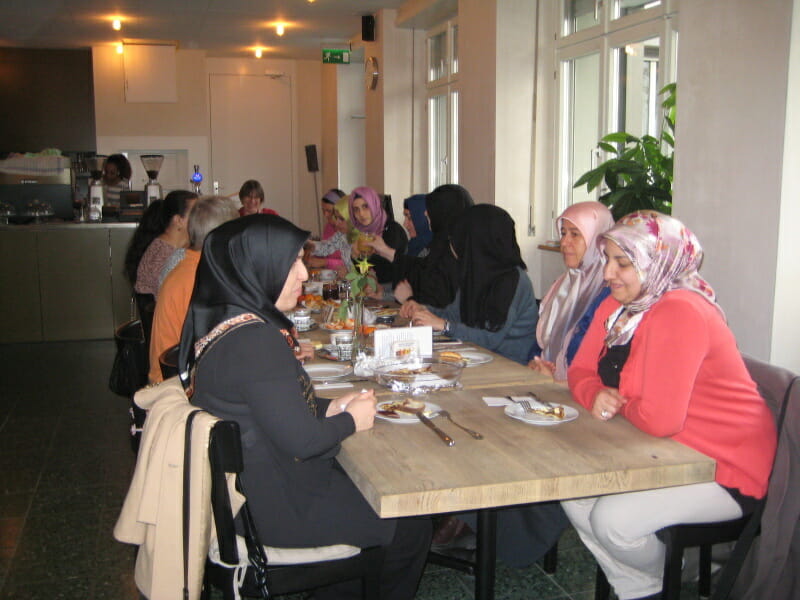 A variety of personal and collective initiatives are currently underway. In France, there was the woman from Paris who paid a visit to a Moroccan store owner and to an Algerian pharmacist to renew their friendship; the couple from Vendée who support local associations that welcome immigrants, involved in the Islamic-Christian Friends Group (GAIC) in Mulhouse; in Alsace, which has intensified its involvement in the Interreligious Week that is taking place in November; a parish priest from the Paris suburb, who wrote a common declaration of peace with Muslims from his quarter; the active participation in the interreligious festival Vivre ensemble à Cannes that was awarded the Chiara Lubich Fraternity Prize; the shared organizing of the 2cnd edition of “Muslims and Christians together with Mary” planned for April 2, 2016 at the Basilica of Longpont, Essone. In Italy, everyone is being invited to get out and meet the Muslim world that lives on Italian soil, striving to build bridges, to create relationships, to work together in concrete projects for peace. In some cities these relationships have been in place for quite a while and have already borne the fruits of brotherhood.
A variety of personal and collective initiatives are currently underway. In France, there was the woman from Paris who paid a visit to a Moroccan store owner and to an Algerian pharmacist to renew their friendship; the couple from Vendée who support local associations that welcome immigrants, involved in the Islamic-Christian Friends Group (GAIC) in Mulhouse; in Alsace, which has intensified its involvement in the Interreligious Week that is taking place in November; a parish priest from the Paris suburb, who wrote a common declaration of peace with Muslims from his quarter; the active participation in the interreligious festival Vivre ensemble à Cannes that was awarded the Chiara Lubich Fraternity Prize; the shared organizing of the 2cnd edition of “Muslims and Christians together with Mary” planned for April 2, 2016 at the Basilica of Longpont, Essone. In Italy, everyone is being invited to get out and meet the Muslim world that lives on Italian soil, striving to build bridges, to create relationships, to work together in concrete projects for peace. In some cities these relationships have been in place for quite a while and have already borne the fruits of brotherhood. 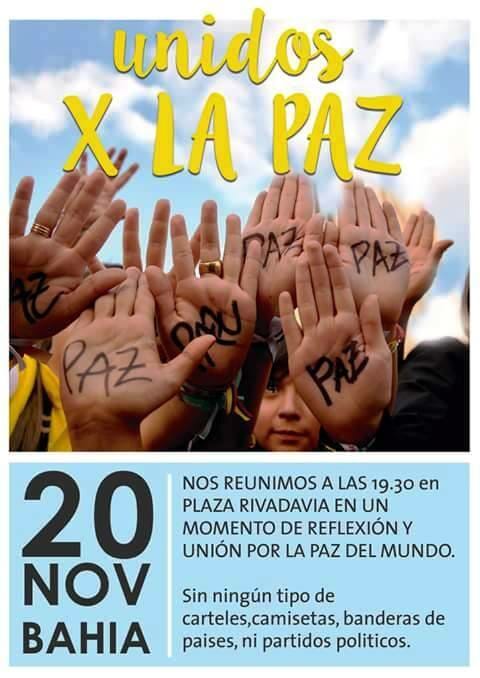 In Great Britain a prayer chain was begun for the victims of the tragedy, asking God to make them “instruments for bringing unity into their local environments.” In Ireland an evening event was held to acquaint people with the Syrian culture in view of welcoming the refugees. In Switzerland Muslim and Christian women meet every two months to share their faith. In Lugano there was an intense sharing with Imam Samir Jelassi. In Meiningen, Austria, a few days before the attack, 150 people gathered with Cenap Aydin, Director of the Tevere Institute in Rome, Italy, and Dr. Siebenrock from the University of Innsbruck, from a study group of Muslim theologians from Iran, Tunisia, Algeria and Turkey, and with Catholic theologians. In Augsburg, Germany, there was the “7 On the Dot – Augsburg Prays For Peace,” every evening at seven o’clock in one of the largest churches in the city – once in the Catholic church, once in the Lutheran church. One refugee, one expert or representative from an NGO would describe the situation of a country under siege. There was also a peace march in Loppiano, Italy and a public rally in Bahia Blanca Square in Argentina without national flags or party banners. In California a benefit dinner was held to gather funds in support of refugees, preceded by a moment of prayer for the victims of the terrorist attacks in Paris and Beirut, and a presentation of the United World Project. On November 14th in Honduras there was a peace march organized by the Focolare Movement in solidarity with Syria which gathered people from several youth movements with a message of unity and dialogue. Luigi Butori writes from Asia: “I think of the dead from the daily attacks in southern Thailand, of the Rohingya refugees. I think of the Muslim friends at the mosque in Chiang Mai. I think of Mae Sot where refugees continue to arrive from Myanmar in search of a better life.”
In Great Britain a prayer chain was begun for the victims of the tragedy, asking God to make them “instruments for bringing unity into their local environments.” In Ireland an evening event was held to acquaint people with the Syrian culture in view of welcoming the refugees. In Switzerland Muslim and Christian women meet every two months to share their faith. In Lugano there was an intense sharing with Imam Samir Jelassi. In Meiningen, Austria, a few days before the attack, 150 people gathered with Cenap Aydin, Director of the Tevere Institute in Rome, Italy, and Dr. Siebenrock from the University of Innsbruck, from a study group of Muslim theologians from Iran, Tunisia, Algeria and Turkey, and with Catholic theologians. In Augsburg, Germany, there was the “7 On the Dot – Augsburg Prays For Peace,” every evening at seven o’clock in one of the largest churches in the city – once in the Catholic church, once in the Lutheran church. One refugee, one expert or representative from an NGO would describe the situation of a country under siege. There was also a peace march in Loppiano, Italy and a public rally in Bahia Blanca Square in Argentina without national flags or party banners. In California a benefit dinner was held to gather funds in support of refugees, preceded by a moment of prayer for the victims of the terrorist attacks in Paris and Beirut, and a presentation of the United World Project. On November 14th in Honduras there was a peace march organized by the Focolare Movement in solidarity with Syria which gathered people from several youth movements with a message of unity and dialogue. Luigi Butori writes from Asia: “I think of the dead from the daily attacks in southern Thailand, of the Rohingya refugees. I think of the Muslim friends at the mosque in Chiang Mai. I think of Mae Sot where refugees continue to arrive from Myanmar in search of a better life.”
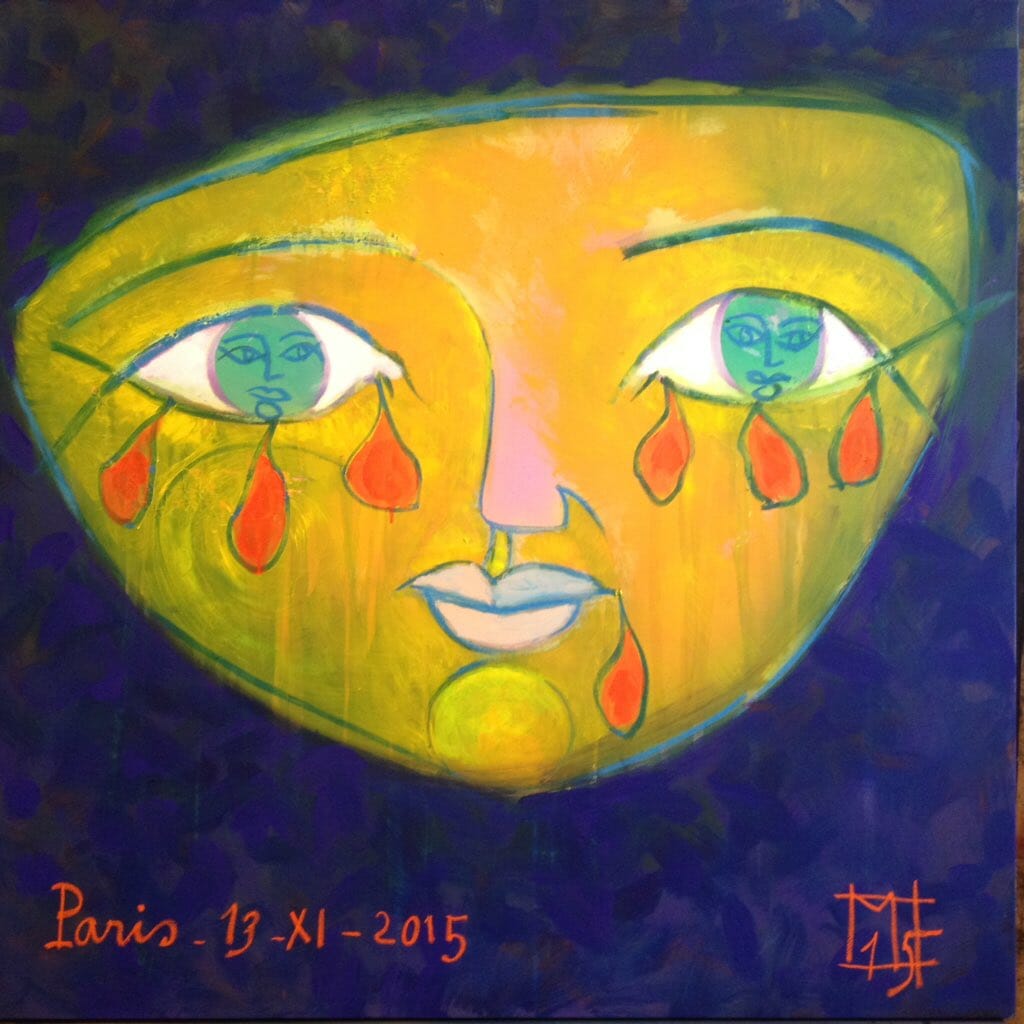
“Dieu pleure avec nous” © Michel Pochet
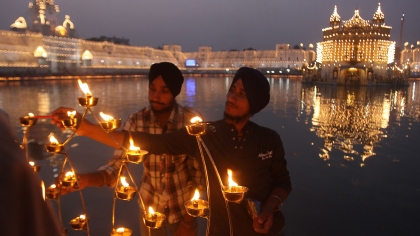
Nov 19, 2015 | Focolare Worldwide
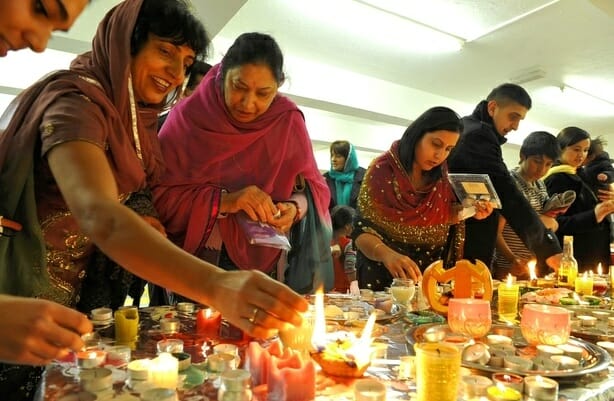 During the Ashwayuja month, which usually falls between October and November, India is clothed in celebration and light. It’s Diwali, a tradition that goes back to the ancient legend of King Rama who after 14 years of exile in the forest, returned to the city of Ayodhya where he was welcomed by a parade (avali) of lights (dipa) in his honour. Hence the name: Dipawali or Diwali.This year it was celebrated during 10-15 November. The festivities begin with a good house cleaning while many small lamps are positioned in several points of the dwelling – entrances, window sills, lounges – and in the darkness of the night the whole city is transformed into a dreamlike fairyland scene. The light symbolises knowledge and inner awareness. But like a kaleidoscope, the meanings intersect and are magnified: knowledge conquers ignorance; interiority brings peace. Good conquers evil; light triumphs over shadows of darkness, and it unleashes the life force. People look forward to the feast all year. On the third day – the actual Diwali – people put on new clothes, adorn themselves with wreathes of flowers and glittering jewelry. They exchange gifts with relatives and friends, especially sweets and homemade snacks. Everyone attends the religious services in honour of Laskshmi, the goddess of wellbeing. In an atmosphere of peace, they carry leaves, coins and religious images, chanting Vedic mantras to receive her blessing. Then there are the games: cards, especially rummy, mimes, dances, treasure hunts and fireworks.
During the Ashwayuja month, which usually falls between October and November, India is clothed in celebration and light. It’s Diwali, a tradition that goes back to the ancient legend of King Rama who after 14 years of exile in the forest, returned to the city of Ayodhya where he was welcomed by a parade (avali) of lights (dipa) in his honour. Hence the name: Dipawali or Diwali.This year it was celebrated during 10-15 November. The festivities begin with a good house cleaning while many small lamps are positioned in several points of the dwelling – entrances, window sills, lounges – and in the darkness of the night the whole city is transformed into a dreamlike fairyland scene. The light symbolises knowledge and inner awareness. But like a kaleidoscope, the meanings intersect and are magnified: knowledge conquers ignorance; interiority brings peace. Good conquers evil; light triumphs over shadows of darkness, and it unleashes the life force. People look forward to the feast all year. On the third day – the actual Diwali – people put on new clothes, adorn themselves with wreathes of flowers and glittering jewelry. They exchange gifts with relatives and friends, especially sweets and homemade snacks. Everyone attends the religious services in honour of Laskshmi, the goddess of wellbeing. In an atmosphere of peace, they carry leaves, coins and religious images, chanting Vedic mantras to receive her blessing. Then there are the games: cards, especially rummy, mimes, dances, treasure hunts and fireworks.  Diwali is not only a Hindu feast. It is a cultural and social event that involves the whole country, with some variations depending on the region and its dominant religion. It is celebrated by Muslims, Buddhists and Christians. For five days the Focolare houses in Mumbai, New Delhi, Bangalore, Goa and the 13 educational centres that are connected to them, are covered in light. The centres serve 1,500 children and teenagers, most of them Hindu who, thanks to financial support from a distance are provided with an education, a daily hot meal and health care (www.afnonlus.org). The Diwali rituals reveal the great sensitivity of the Indian people the way it values the family, friendship, harmony of life and respect for the natural environment. It is significant that for Diwali, you buy impersonal objects, but you give gifts that have been made by your own hands. It is also significant that along with prayers, fruits of the earth are offered as an expression of gratitude towards Nature and its gifts. This custom is echoed in Pope Francis’s Encyclical Laudato si’. It was precisely that document and the inseparable link between living in harmony with creation and with others, that inspired the Pontifical Council for Interreligious Dialogue to send the Deepavali Message from Pope Francis to the nearly billion followers of the Sanatan Dhama (what Westerners call Hinduism). Pope Francis’s Message shares the wish that: “we Hindus and Christians, together with people of all religious traditions and good will, always foster a culture which promotes human ecology.” The Message also expresses a wish that “together, we consciously give ourselves to protecting nature, defending the poor, and building networks of respect and fraternity” (Laudato Si, 201). This will anticipate “the growth of the tree of peace” for those who wish to prepare themselves well for the feast of Christmas.
Diwali is not only a Hindu feast. It is a cultural and social event that involves the whole country, with some variations depending on the region and its dominant religion. It is celebrated by Muslims, Buddhists and Christians. For five days the Focolare houses in Mumbai, New Delhi, Bangalore, Goa and the 13 educational centres that are connected to them, are covered in light. The centres serve 1,500 children and teenagers, most of them Hindu who, thanks to financial support from a distance are provided with an education, a daily hot meal and health care (www.afnonlus.org). The Diwali rituals reveal the great sensitivity of the Indian people the way it values the family, friendship, harmony of life and respect for the natural environment. It is significant that for Diwali, you buy impersonal objects, but you give gifts that have been made by your own hands. It is also significant that along with prayers, fruits of the earth are offered as an expression of gratitude towards Nature and its gifts. This custom is echoed in Pope Francis’s Encyclical Laudato si’. It was precisely that document and the inseparable link between living in harmony with creation and with others, that inspired the Pontifical Council for Interreligious Dialogue to send the Deepavali Message from Pope Francis to the nearly billion followers of the Sanatan Dhama (what Westerners call Hinduism). Pope Francis’s Message shares the wish that: “we Hindus and Christians, together with people of all religious traditions and good will, always foster a culture which promotes human ecology.” The Message also expresses a wish that “together, we consciously give ourselves to protecting nature, defending the poor, and building networks of respect and fraternity” (Laudato Si, 201). This will anticipate “the growth of the tree of peace” for those who wish to prepare themselves well for the feast of Christmas.
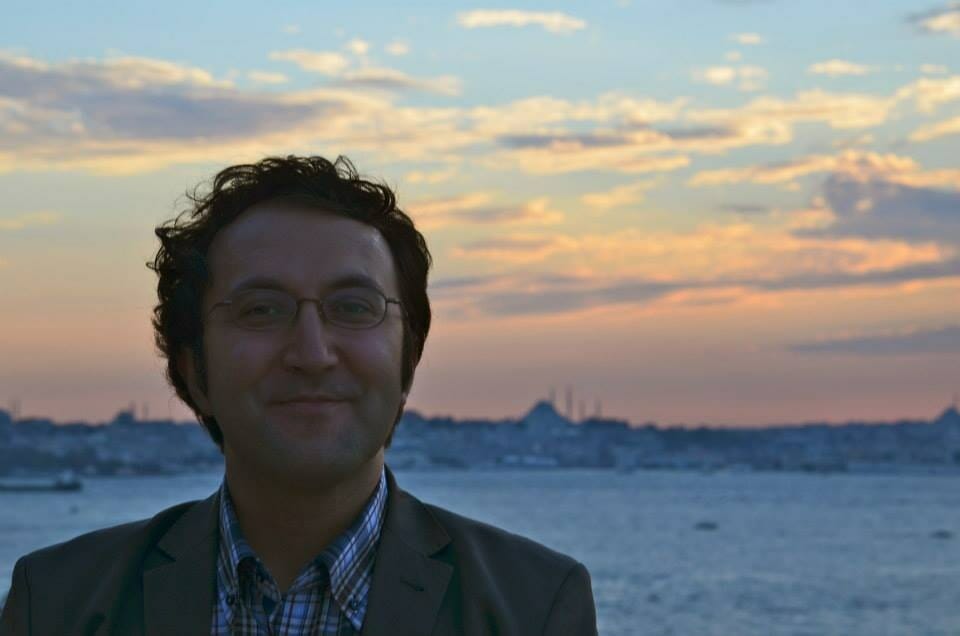
Nov 19, 2015 | Focolare Worldwide, Senza categoria
 “The tragic news of the horrendous terrorist attacks in the French capital has filled us with profound sorrow. Our thoughts, solidarity and prayers go to the victims, the wounded and their families, to their loved ones and to the French people.” With these words of condolence, Mustafa Cenap Aydin, director of the Tevere Centre for Dialogue in Rome expressed his dismay over recent terrorist attacks in France. He went on: “I unite myself to the message of the learned Muslim scholar, writer and educational activist M. Fethullah Gülen: ‘Every terrorist act from whomever it comes, is a heavy blow to the peace and tranquility of all humanity. These vile acts of terrorism are attacks not only against the French people, but also against the universal values of human brotherhood’.” “We will never grow tired of condemning all those who feed violence, hatred and fear by reproachfully abusing a religion, an ideology, for cruel and inhuman goals.” Gülen, who inspires millions with his message of love and compassion, invites everyone to join him in prayer that God would lead “all of humanity to a world of peace and tranquility” and “to act in solidarity against every form of terrorism; to become involved in the realisation of universal peace”. “We shall respond to these ‘inhuman‘ acts,” Mustafa Cenap Aydin concluded, “by reinforcing even more the spirit of unity and brotherhood. These attacks cannot but convince us even more of the importance of dialogue, conciliation and brotherhood; and to increase our commitment to spreading it. We are obviously convinced that peace will prevail. Let us call upon and appeal to one and all, to unite with us in this effort.” Source: Città Nuova in Italian
“The tragic news of the horrendous terrorist attacks in the French capital has filled us with profound sorrow. Our thoughts, solidarity and prayers go to the victims, the wounded and their families, to their loved ones and to the French people.” With these words of condolence, Mustafa Cenap Aydin, director of the Tevere Centre for Dialogue in Rome expressed his dismay over recent terrorist attacks in France. He went on: “I unite myself to the message of the learned Muslim scholar, writer and educational activist M. Fethullah Gülen: ‘Every terrorist act from whomever it comes, is a heavy blow to the peace and tranquility of all humanity. These vile acts of terrorism are attacks not only against the French people, but also against the universal values of human brotherhood’.” “We will never grow tired of condemning all those who feed violence, hatred and fear by reproachfully abusing a religion, an ideology, for cruel and inhuman goals.” Gülen, who inspires millions with his message of love and compassion, invites everyone to join him in prayer that God would lead “all of humanity to a world of peace and tranquility” and “to act in solidarity against every form of terrorism; to become involved in the realisation of universal peace”. “We shall respond to these ‘inhuman‘ acts,” Mustafa Cenap Aydin concluded, “by reinforcing even more the spirit of unity and brotherhood. These attacks cannot but convince us even more of the importance of dialogue, conciliation and brotherhood; and to increase our commitment to spreading it. We are obviously convinced that peace will prevail. Let us call upon and appeal to one and all, to unite with us in this effort.” Source: Città Nuova in Italian
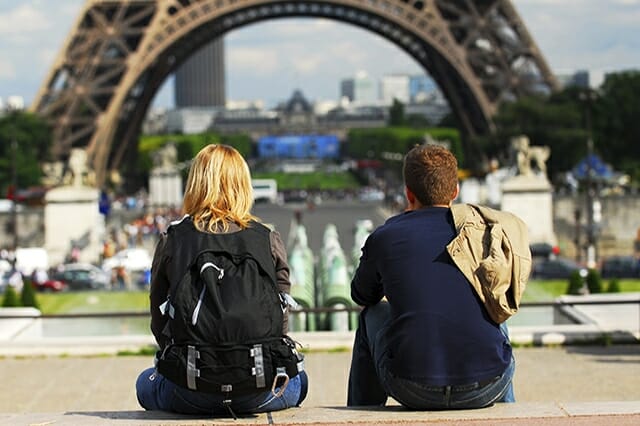
Nov 17, 2015 | Focolare Worldwide
 “This is a horrific and frightening moment. But we are also surprised at the international impact, by all the public support, and we feel responsible for responding appropriately.” Muriel Fleury is the director of the Focolare’s French magazine, Nouvelle Cité and this was her answer to Radio inBlu’s question about why such events could take place in France where the process of integration is older than in any other European country. She responded: “Although in the past we were successful at integrating other peoples, it seems that in recent years we have fallen a bit behind. We want multiculturalism, in the sense of welcoming other, but without taking their cultures into account, their values that are quite different from our own. Therefore, all the places that lend themselves to dialogue, true encounter, true cultural and religious sharing need to be developed. Our failure to have an authentic encounter has led to today’s tragic situation.” Paul Wirth, a member of the Focolare engaged in interreligious dialogue, remarked: “I belong to an Islamic-Christian Friendship Group (GAIC) in France. Every year we hold a week of meetings (the most recent beginning on November 12). We feel that it is very important to make everyone aware, so that people will make a distinction between authentic Muslims and those who claim to be Muslims but project hatred.” Speaking of the reaction of Muslim friends to attacks on Friday evening, he said: “There are many Muslim associations that have put out press releases condemning the attacks as barbaric, intolerable; they want to be close to the victims and their families. Just today I saw that many Muslim associations spoke of this as a horrible moment, and we Christians believe that these tragic events do not affect the relations of fraternal love that have been established amongst us [Christians and Muslims].” In her analysis, Muriel Fleury, director of Nouvelle Cité, pointed to other causes of the unease: “For economic reasons it seems that we have completely abandoned entire quarters of the city where even the police are at risk if they go into them. And our refusal to take care of these young foreigners, to not provide them some wholesome activity to keep them busy, to not be near to them, has led some of them to join radical pseudo-religious groups that have taken them away, many of them, and now we see the results.” From where do we begin, then, to mend such a complex fabric? “The problem,” says Fleury, “is that we are in France where, unfortunately, a spiritual void has been created. This French secularism has led to a denial of the spiritual dimension of a human being. Now we must take a new path, to develop the culture of encounter, of living together. Religions will be one of these paths, religions that are able to work with one another – even with the Republic. There are already signals in this direction that try to find solutions that include every voice from every religion.”
“This is a horrific and frightening moment. But we are also surprised at the international impact, by all the public support, and we feel responsible for responding appropriately.” Muriel Fleury is the director of the Focolare’s French magazine, Nouvelle Cité and this was her answer to Radio inBlu’s question about why such events could take place in France where the process of integration is older than in any other European country. She responded: “Although in the past we were successful at integrating other peoples, it seems that in recent years we have fallen a bit behind. We want multiculturalism, in the sense of welcoming other, but without taking their cultures into account, their values that are quite different from our own. Therefore, all the places that lend themselves to dialogue, true encounter, true cultural and religious sharing need to be developed. Our failure to have an authentic encounter has led to today’s tragic situation.” Paul Wirth, a member of the Focolare engaged in interreligious dialogue, remarked: “I belong to an Islamic-Christian Friendship Group (GAIC) in France. Every year we hold a week of meetings (the most recent beginning on November 12). We feel that it is very important to make everyone aware, so that people will make a distinction between authentic Muslims and those who claim to be Muslims but project hatred.” Speaking of the reaction of Muslim friends to attacks on Friday evening, he said: “There are many Muslim associations that have put out press releases condemning the attacks as barbaric, intolerable; they want to be close to the victims and their families. Just today I saw that many Muslim associations spoke of this as a horrible moment, and we Christians believe that these tragic events do not affect the relations of fraternal love that have been established amongst us [Christians and Muslims].” In her analysis, Muriel Fleury, director of Nouvelle Cité, pointed to other causes of the unease: “For economic reasons it seems that we have completely abandoned entire quarters of the city where even the police are at risk if they go into them. And our refusal to take care of these young foreigners, to not provide them some wholesome activity to keep them busy, to not be near to them, has led some of them to join radical pseudo-religious groups that have taken them away, many of them, and now we see the results.” From where do we begin, then, to mend such a complex fabric? “The problem,” says Fleury, “is that we are in France where, unfortunately, a spiritual void has been created. This French secularism has led to a denial of the spiritual dimension of a human being. Now we must take a new path, to develop the culture of encounter, of living together. Religions will be one of these paths, religions that are able to work with one another – even with the Republic. There are already signals in this direction that try to find solutions that include every voice from every religion.”

 The 34th Conference of Bishops of different Churches, promoted by the Focolare Movement, will start on 25 November 2015. It will be held on the island of Heybeliada (Halki), in the sea of Marmara, near Istanbul. The 150 participants, from 9 different countries, will be hosted in the Monastery on this island, which was once the seat of the prestigious Greek-Orthodox theological Academy of Halki. The 50 participants, from 19 countries, are much awaited by His Holiness Bartholomew I, who during a recent interview, in the wake of the Honoris Causa doctorate in the Culture of Unity conferred upon him by the Sophia University Institute, affirmed that: “At Halki we will together remember Chiara Lubich and pray for the repose of her soul. We will be able to express our commitment to work for the unity of Churches. We, the Church of Constantinople are pleased to welcome these cardinals and bishops, and we are ready to exchange our experiences and give one another the kiss of peace between the East and the West”. “Together for our common home” will be the theme of this conference, which will focus on unity, as a service to the human family, through a diversity of gifts. The main speakers will be Patriarch Bartholomew I and Maria Voce, while Cardinal Francis Kriengsak, Archbishop of Bangkok will be the moderator of the conference. Various bishops from different Churches will share their reflections; among them, the Anglican Bishop Robin Smith; Åke Bonnier, Lutheran Bishop of the Swedish Church; the Catholic Bishop Brendan Leahy, Bishop Sahak Mashalyan of the Armenian Apostolic Church and the Metropolitan Elpidophoros of Halki. Jesús Morán, the co-president of the Focolare Movement will offer his reflection on “The Charism of Unity and the challenges of today’s humanity”. Gerhard Pross, an Evangelical from YMCA, Germany will speak about “Achievements and experiences on the road to unity” in the name of “Together for Europe”, the ecumenical network of movements and communities. Cardinal Kurt Koch, who will lead a Holy See delegation to Istanbul for St. Andrew’s feast, will also speak during the Conference. His talk will be about “Pope Francis and the cause of Christian Unity”. In a church of Armenian Apostolic tradition of ancient Chalcedon, the seat of the Chalcedonian Ecumenical Council of 451, the bishops will once again formulate a pact of reciprocal love, thus renewing the mutual relationship of charity that goes beyond all divisions and answers Jesus’s invitation: “Love one another as I have loved you” (Jn 15:12). In this particular context, this invitation implies the reciprocal promise “to love the Church of the other as one’s own”. The bishops are invited by Patriarch Bartholomew to participate in the celebrations at the Phanar on the 29 and 30 November on the occasion of the feast of St. Andrew, Patron of the Patriarchate of Constantinople. These meetings for bishops of different Churches, promoted by the Focolare Movement, are held annually. These meetings have been taking place since 1982, and they owe their beginning to a suggestion made by Pope John Paul II to a group of Catholic bishops, friends of the Focolare Movement, when he invited them to share their experience of “effective and affective” communion even with bishops of other churches. Promoted by Klaus Hemmerle, who was then bishop of Aaachen, Germany, and after his death by Miloslav Vlk, Cardinal of Prague, these meetings aim at offering vital spaces of communion and fraternal sharing in the light of the spirituality of unity. The venue for these meetings changes; they are held in places that are meaningful to the various Christian denominations. In 2016 the meeting will be held in Ottmaring (Augsburg – Germany).
The 34th Conference of Bishops of different Churches, promoted by the Focolare Movement, will start on 25 November 2015. It will be held on the island of Heybeliada (Halki), in the sea of Marmara, near Istanbul. The 150 participants, from 9 different countries, will be hosted in the Monastery on this island, which was once the seat of the prestigious Greek-Orthodox theological Academy of Halki. The 50 participants, from 19 countries, are much awaited by His Holiness Bartholomew I, who during a recent interview, in the wake of the Honoris Causa doctorate in the Culture of Unity conferred upon him by the Sophia University Institute, affirmed that: “At Halki we will together remember Chiara Lubich and pray for the repose of her soul. We will be able to express our commitment to work for the unity of Churches. We, the Church of Constantinople are pleased to welcome these cardinals and bishops, and we are ready to exchange our experiences and give one another the kiss of peace between the East and the West”. “Together for our common home” will be the theme of this conference, which will focus on unity, as a service to the human family, through a diversity of gifts. The main speakers will be Patriarch Bartholomew I and Maria Voce, while Cardinal Francis Kriengsak, Archbishop of Bangkok will be the moderator of the conference. Various bishops from different Churches will share their reflections; among them, the Anglican Bishop Robin Smith; Åke Bonnier, Lutheran Bishop of the Swedish Church; the Catholic Bishop Brendan Leahy, Bishop Sahak Mashalyan of the Armenian Apostolic Church and the Metropolitan Elpidophoros of Halki. Jesús Morán, the co-president of the Focolare Movement will offer his reflection on “The Charism of Unity and the challenges of today’s humanity”. Gerhard Pross, an Evangelical from YMCA, Germany will speak about “Achievements and experiences on the road to unity” in the name of “Together for Europe”, the ecumenical network of movements and communities. Cardinal Kurt Koch, who will lead a Holy See delegation to Istanbul for St. Andrew’s feast, will also speak during the Conference. His talk will be about “Pope Francis and the cause of Christian Unity”. In a church of Armenian Apostolic tradition of ancient Chalcedon, the seat of the Chalcedonian Ecumenical Council of 451, the bishops will once again formulate a pact of reciprocal love, thus renewing the mutual relationship of charity that goes beyond all divisions and answers Jesus’s invitation: “Love one another as I have loved you” (Jn 15:12). In this particular context, this invitation implies the reciprocal promise “to love the Church of the other as one’s own”. The bishops are invited by Patriarch Bartholomew to participate in the celebrations at the Phanar on the 29 and 30 November on the occasion of the feast of St. Andrew, Patron of the Patriarchate of Constantinople. These meetings for bishops of different Churches, promoted by the Focolare Movement, are held annually. These meetings have been taking place since 1982, and they owe their beginning to a suggestion made by Pope John Paul II to a group of Catholic bishops, friends of the Focolare Movement, when he invited them to share their experience of “effective and affective” communion even with bishops of other churches. Promoted by Klaus Hemmerle, who was then bishop of Aaachen, Germany, and after his death by Miloslav Vlk, Cardinal of Prague, these meetings aim at offering vital spaces of communion and fraternal sharing in the light of the spirituality of unity. The venue for these meetings changes; they are held in places that are meaningful to the various Christian denominations. In 2016 the meeting will be held in Ottmaring (Augsburg – Germany).

 «The key perspective of this trip will be revealed in the
«The key perspective of this trip will be revealed in the  In the Central African Republic, in a tense political context which suscitates anxiety, «in order to manifest to this nation how much the Church feels and shares its afflictions, and urge all central Africans to always be testimonials of mercy and reconciliation,» on 29 November, Francis will open the holy door of the cathedral of Bangui, symbolically anticipating the start of the
In the Central African Republic, in a tense political context which suscitates anxiety, «in order to manifest to this nation how much the Church feels and shares its afflictions, and urge all central Africans to always be testimonials of mercy and reconciliation,» on 29 November, Francis will open the holy door of the cathedral of Bangui, symbolically anticipating the start of the 
 In the face of the dramatic events that took place in Paris and in many other parts of the world, “the Focolare Movement, while it weeps with those who weep, continues to believe in the path of dialogue, of acceptance and of respect for the other, whoever that may be and from whatever provenance, religious belief, and ethnicity,” Focolare president Maria Voce
In the face of the dramatic events that took place in Paris and in many other parts of the world, “the Focolare Movement, while it weeps with those who weep, continues to believe in the path of dialogue, of acceptance and of respect for the other, whoever that may be and from whatever provenance, religious belief, and ethnicity,” Focolare president Maria Voce 



 During the Ashwayuja month, which usually falls between October and November, India is clothed in celebration and light. It’s Diwali, a tradition that goes back to the ancient legend of King Rama who after 14 years of exile in the forest, returned to the city of Ayodhya where he was welcomed by a parade (avali) of lights (dipa) in his honour. Hence the name: Dipawali or Diwali.This year it was celebrated during 10-15 November. The festivities begin with a good house cleaning while many small lamps are positioned in several points of the dwelling – entrances, window sills, lounges – and in the darkness of the night the whole city is transformed into a dreamlike fairyland scene. The light symbolises knowledge and inner awareness. But like a kaleidoscope, the meanings intersect and are magnified: knowledge conquers ignorance; interiority brings peace. Good conquers evil; light triumphs over shadows of darkness, and it unleashes the life force. People look forward to the feast all year. On the third day – the actual Diwali – people put on new clothes, adorn themselves with wreathes of flowers and glittering jewelry. They exchange gifts with relatives and friends, especially sweets and homemade snacks. Everyone attends the religious services in honour of Laskshmi, the goddess of wellbeing. In an atmosphere of peace, they carry leaves, coins and religious images, chanting Vedic mantras to receive her blessing. Then there are the games: cards, especially rummy, mimes, dances, treasure hunts and fireworks.
During the Ashwayuja month, which usually falls between October and November, India is clothed in celebration and light. It’s Diwali, a tradition that goes back to the ancient legend of King Rama who after 14 years of exile in the forest, returned to the city of Ayodhya where he was welcomed by a parade (avali) of lights (dipa) in his honour. Hence the name: Dipawali or Diwali.This year it was celebrated during 10-15 November. The festivities begin with a good house cleaning while many small lamps are positioned in several points of the dwelling – entrances, window sills, lounges – and in the darkness of the night the whole city is transformed into a dreamlike fairyland scene. The light symbolises knowledge and inner awareness. But like a kaleidoscope, the meanings intersect and are magnified: knowledge conquers ignorance; interiority brings peace. Good conquers evil; light triumphs over shadows of darkness, and it unleashes the life force. People look forward to the feast all year. On the third day – the actual Diwali – people put on new clothes, adorn themselves with wreathes of flowers and glittering jewelry. They exchange gifts with relatives and friends, especially sweets and homemade snacks. Everyone attends the religious services in honour of Laskshmi, the goddess of wellbeing. In an atmosphere of peace, they carry leaves, coins and religious images, chanting Vedic mantras to receive her blessing. Then there are the games: cards, especially rummy, mimes, dances, treasure hunts and fireworks. 
